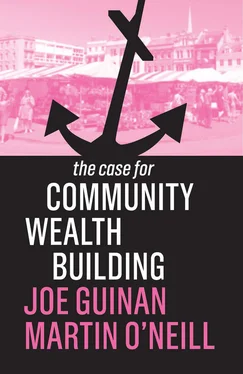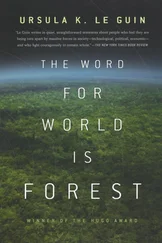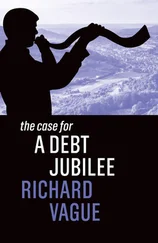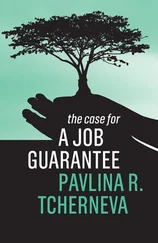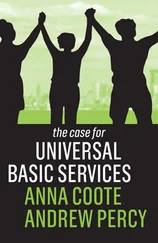1 Cover
2 Front Matter The Case for Community Wealth Building Joe Guinan Martin O’Neill polity
3 Preface and Acknowledgements
4 Introduction: Economic Change, Starting at the Local Level
5 1 What is Community Wealth Building? Two Models of Community Wealth Building: Cleveland and Preston Origins of Community Wealth Building: A Response to Crisis and Pain The Emerging Mosaic: Elements of the Democratic Economy A New Institutional Settlement? Notes
6 2 Taking Control: Arguing for Community Wealth Building Justifying Community Wealth Building Political Values and Public Control Extending Democracy A Society of Equals Equality and Democracy in Local Economies Responding to Critiques of Community Wealth Building On Prisoner’s Dilemmas, Zero-Sum Games, and ‘Municipal Protectionism’ Rent Extraction, Capture by Special Interests, and the Alleged Impossibility of Democracy Too Many Meetings? ‘The Problem With Socialism is That it Takes Too Many Evenings’ Conclusion: Building Democratic and Egalitarian Local Economies Notes
7 3 Community Wealth Building and the Institutional Turn: Routes to a Democratic Economy Principles of a Democratic Economy: The Need for Systemic Change Returns to Capital Moving to Large-Order Change Labour’s Institutional Turn Notes
8 Further Reading and Resources for Action Notes
9 Index
10 End User License Agreement
1 Cover
2 Table of Contents
3 Begin Reading
1 Chapter 1Two Approaches to Economic Development
1 a
2 ii
3 iii
4 iv
5 v
6 viii
7 ix
8 x
9 xi
10 xii
11 xiii
12 xiv
13 xv
14 1
15 2
16 3
17 4
18 5
19 6
20 7
21 8
22 9
23 10
24 11
25 12
26 13
27 14
28 15
29 16
30 17
31 18
32 19
33 20
34 21
35 22
36 23
37 24
38 25
39 26
40 27
41 28
42 29
43 30
44 31
45 32
46 33
47 34
48 35
49 36
50 37
51 38
52 39
53 40
54 41
55 42
56 43
57 44
58 45
59 46
60 47
61 48
62 49
63 50
64 51
65 52
66 53
67 54
68 55
69 56
70 57
71 58
72 59
73 60
74 61
75 62
76 63
77 64
78 65
79 66
80 67
81 68
82 69
83 70
84 71
85 72
86 73
87 74
88 75
89 76
90 77
91 78
92 79
93 80
94 81
95 82
96 83
97 84
98 85
99 86
100 87
101 88
102 89
103 90
104 91
105 92
106 93
107 94
108 95
109 96
110 97
111 98
112 99
113 100
114 101
115 102
116 103
117 104
118 105
119 106
120 107
121 108
122 109
123 110
124 111
125 112
126 113
127 114
128 115
129 116
130 117
131 130
132 131
133 132
134 133
135 134
136 135
137 136
138 137
139 138
‘A new approach to economics is needed to tackle grotesque inequalities of wealth and power. Community Wealth Building offers a way for communities to confront corporate power and build a more equal and democratic economy. In this book Joe Guinan and Martin O’Neill show what inspiring action is already happening on the ground and point beyond to what is possible.’
Jeremy Corbyn MP, Leader of the Labour Party
‘Change is coming, and another world is not just possible but already within reach. Joe Guinan and Martin O’Neill show how Community Wealth Building approaches can allow every community in the country to play their part in building a new economy from the ground up.’
John McDonnell MP, Shadow Chancellor of the Exchequer
‘Joe Guinan and Martin O’Neill present a compelling vision of a more just, democratic economy in which wealth and power are more fairly shared. This book should be read by anyone who believes that a different economic order is possible and wants to know how we start to make it happen.’
Ed Miliband, MP for Doncaster North and former Leader of the Labour Party
‘If you want to make the city where you live more equal and more democratic, this is the book for you. It shows what local government, institutions, and people can do to create a better world – even without the support of central government. It is at once both practical and inspiring.’
Richard Wilkinson and Kate Pickett, authors of The Spirit Level and The Inner Level
‘ The Case for Community Wealth Building is an essential guide to a new and devolved economic movement that challenges forty years of neoliberalism and austerity. It articulates real progress towards a transformed and democratic economy.’
Councillor Matthew Brown, Leader of Preston City Council
Sam Pizzigati, The Case for a Maximum Wage
Louise Haagh, The Case for Universal Basic Income
James K. Boyce, The Case for Carbon Dividends
Frances Coppola, The Case for People’s Quantitative Easing
Joe Guinan & Martin O’Neill, The Case for Community Wealth Building
The Case for Community Wealth Building
Joe Guinan
Martin O’Neill
polity
Copyright © Joe Guinan and Martin O’Neill 2020
The right of Joe Guinan and Martin O’Neill to be identified as Author of this Work has been asserted in accordance with the UK Copyright, Designs and Patents Act 1988.
First published in 2020 by Polity Press
Polity Press
65 Bridge Street
Cambridge CB2 1UR, UK
Polity Press
101 Station Landing
Suite 300
Medford, MA 02155, USA
All rights reserved. Except for the quotation of short passages for the purpose of criticism and review, no part of this publication may be reproduced, stored in a retrieval system or transmitted, in any form or by any means, electronic, mechanical, photocopying, recording or otherwise, without the prior permission of the publisher.
ISBN-13: 978-1-5095-3904-8
A catalogue record for this book is available from the British Library.
The publisher has used its best endeavours to ensure that the URLs for external websites referred to in this book are correct and active at the time of going to press. However, the publisher has no responsibility for the websites and can make no guarantee that a site will remain live or that the content is or will remain appropriate.
Every effort has been made to trace all copyright holders, but if any have been overlooked the publisher will be pleased to include any necessary credits in any subsequent reprint or edition.
For further information on Polity, visit our website: politybooks.com
For Patricia Harvey and Elizabeth O’Neill
Preface and Acknowledgements
All politics is local.
Tip O’Neill
People live in particular places and in particular communities, and the politics and economics of those places and communities matter hugely for the quality of their lives. These are basic, inescapable facts of human existence, but facts that are often peculiarly overlooked in discussions of social justice and economic policy. And so this is a book about public policy and the pursuit of social justice – but a book whose focus is very much on the local level.
Читать дальше
